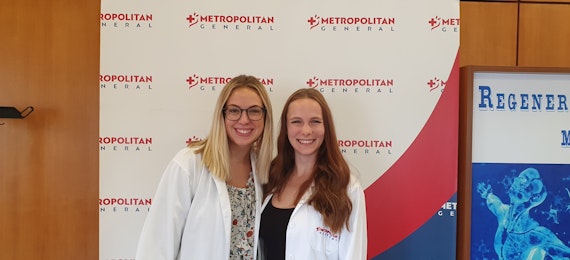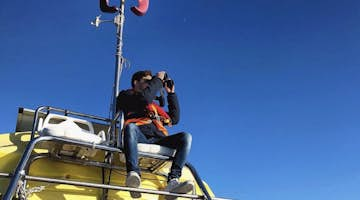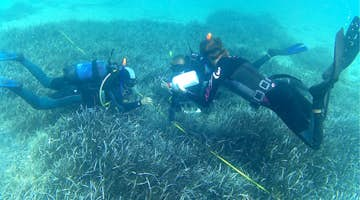
Marine Mammals Research & Conservation
Marine Mammals Research & Conservation remote internships out of Greece are hosted by a highly respected non-profit NGO. This institute combines multidisciplinary scientific research with efficient conservation work, gaining understanding of populations and behavior of whales, dolphins and porpoises in the Mediterranean.
What to expect from your Marine Mammals Research & Conservation internship:
- Intern in a top NGO leading research and conservation in Greece
- Contribute to real scientific dolphin research
- Inform conservation methods and give feedback on past efforts
- Gain real-world conservation experience by interning remotely from home without having to travel
Your internship abroad host organization:
- NGOs
Internship details
On this virtual internship in marine conservation you will assist with researching dolphin populations and behavior, working alongside expert marine scientists researchers to support dolphin conservation in Greece.
Scientific research into marine mammal populations plays a guiding role in conservation efforts in the Mediterranean Sea, and remote marine conservation internships have a key support role in producing data. Interns are placed with leading NGOs to support conservationists and scientists working to preserve populations of local whales, dolphins and porpoises.
Remote interns aid the NGO by helping to analyze and interpret marine mammal sightings data, which is used to influence local conservation and environmental management strategies. Example projects that remote interns may expect to focus on include:
Photo identification
Photo-identification is a common technique that allows researchers to identify individuals of the dolphin species Delphinus delphis. The NGO has a large library of photos collected over the past 20 years, but only a small part of this library has been processed.
By analyzing photos and using distinguishing features of dorsal fins, such as pigmentation patterns, scarring, and notches, interns can help to provide accurate data on the change in Delphinus delphis population numbers. This is important information that provides feedback on different conservation techniques over a period of time.
Assessing pod structures
The number of calves, juveniles and adults within a dolphin pod reveals valuable information about the success of breeding grounds and seasons over the space of many years. Remote interns assist the collating of data by analyzing the pod structure of dolphin sightings from boat surveys. Interns create informative maps using the information, so must have experience using GIS to create these maps.
Population monitoring
Drone technology provides a modern way of observing whales, dolphins and porpoises (cetaceans) with minimal human disturbance. Interns can join drone research projects via livestream or use recorded video and images to identify mammal species and behavior. This information is used to compare cetacean behaviour collected from boat surveys to identify the effects of human presence.
In all cases, interns should expect that the initial phase of their remote internship will focus on gaining some introductory knowledge. You may start by gaining an understanding or overview of what you can build upon, develop, learn, and contribute. Ensure that you ask questions and provide feedback during the introductory period, so that your supervisor understands how you’re progressing. This will help them to better understand important details, such as how quickly you learn, what you find challenging, what you find interesting, etc.
Understand and expect that individual internship experiences vary. Therefore, if you’re at a more introductory level, you should reasonably expect a more introductory internship. Likewise, if you’re interning for a shorter duration, you will have a different experience from someone who is interning for a longer duration. Placement preferences are considered but always subject to availability.
What are the career benefits of interning abroad as a Marine Mammals Research & Conservation Intern?
Marine Mammals Research & Conservation interns learn from a qualified and experienced supervisor, and can be involved in:
-
Photo identification
-
Assessing dolphin pod size and structure
-
GIS mapping
-
Analyzing drone video footage
-
Mammal behavior analysis
Professional development opportunities:
-
Experience contributing to scientific monitoring
-
Use and understand GIS mapping techniques
-
Understand dolphin pod structures and behavior
-
Gain practical skills and boost your employability, with guidance from RISEWAY’s Experiential Learning Curriculum to support your learning and cultural intelligence.
Are you eligible for this internship?
Submit a free application so we can confirm your eligibility and check availability for your preferred dates.
Not sure which program to join?
What recent Marine Mammals Research & Conservation interns said about their experience
This placement has contributed towards my university placement year and has also prepared me for my following placement in Greece where I will completing similar work and activities.
My remote Marine Mammals Research & Conservation internship aligned with previous working experience, as well as interests that even preceded my studies both in undergraduate and graduate school. It helped me learn how to be better with managing projects and my workload on a schedule that I create, as well as how to effectively communicate my progress to my program supervisor. I'm grateful to have been connected to such a program and hope to work with them in the future - maybe even in person to collect the fieldwork. Although it was only a remote position, I was able to challenge myself and learn how to use programs I wouldn't otherwise have learned on my own - such as a behavioral analysis program and writing with R. I hope to find a more permanent or long-term position sometime in this field and this was an incredible stepping stone for that journey.
I chose this program because it promised flexibility and career insight. I enjoyed a lot of independence and was able to work on a research project which was structured as realistically as possible. I enjoyed meeting my mentor and appreciate all I was able to learn from her. I think it is always beneficial to have some kind of experience to be successful in any work field. Since I started without any knowledge about scientific research with marine mammals, everything I was able to do, and that was shared with me by my mentor, was a learning point.
This internship has given me a 30,000 foot view into the world of marine mammals and has helped me begin in developing that skillset further. My internship gave me an opportunity to work independently on a project studying the behavior of two species of dolphins in the Mediterranean. There is not a lot of data from this area on these two species and they are both in decline, with the short-beaked dolphin listed as endangered in the Mediterranean. This project contributed toward the development of some baseline data on these two species in the short-term, while also helping the organization with best-practice decision making in the long-term, to help protect these species. My number one take-away was learning just how important proper data collection is when it comes to analyzing data. I feel more empowered because I was able to analyze data from marine mammals, namely dolphins, that I had very little general knowledge of in the beginning. My most significant learning points were using BORIS, and understanding what different states, events and categories of behaviors various dolphin species perform. The supervisors and staff are extremely helpful in guiding you in the right direction and being supportive and patient. I would advise other interns to take every opportunity to learn from those you are working with. They want to help you grow and they have a wealth of knowledge in this area!
I learned a lot about professional communication and how to work in a workplace with someone you are reporting to. I have also learned valuable skills in writing about research. I was able to construct my own literature review and research proposal. I was able to get feedback on these papers as well, helping me improve my skills. My host organization was always willing to meet with me if I needed anything. They made it clear that if I was ever confused or unsure of my tasks, they were more than willing to help me! During my research, I conducted my own research project using data collected from observations done in the Aegean Sea. I wrote both a literature review and research proposal in order to prepare for the study. I used a behavior cataloging software, BORIS, to collect data on the videos. Additionally, I used GIS mapping software to create maps to compare location of sightings to numerous variables. My biggest takeaway was learning how to use GIS software. A GIS class is a requirement in my major at university and I feel much more confident going into that class knowing that I have some experience with it.
Having completed my internship, I have gained a huge amount of knowledge and awareness relating to marine mammals and conservation. The biggest part of my role was analyzing photos of dolphin fins to assess the quality of the photos, the type of fin and whether they were already included in the organization’s catalogue. By identifying and cataloguing individuals from a marine mammal species (such as the short-beaked common dolphin) the researchers could estimate the population in that study area to understand whether it has decreased or increased throughout the years. As a result, I feel more confident and comfortable talking to others in this field and feel I can act on matters that are relevant to my studies and my career. Overall, I feel more empowered in my field. Despite being restricted from doing physical field internships because of the pandemic, I am eager to learn more about marine conservation, and no obstacles will stop me from doing so. I think this will be beneficial in the future both on paper and in interviews, as it shows my eagerness and passion for marine conservation and my problem-solving skills.
To read all reviews, visit our reviews page.

Academic credit available for all internships
Get course credit from your college or university while completing your internship abroad or a remote internship program. It's a great way to meet your academic requirements and gain valuable experience at the same time.
Learn about course creditProgram fees
It's free to apply for this internship. Once we have reviewed your suitability and accepted you onto this program, a deposit of US$499 is required to confirm your place. The remaining balance (minus your initial US$499 deposit) will be due within 7 days of being assigned a placement.
Duration |
Program Fee |
|---|---|
| 100 hours (3 weeks full time, or 5 weeks part time) | $1,099 |
| 250 hours (8 weeks full time, or 12 weeks part time) | $1,499 |
| 350 hours (13 weeks full time, or 17 weeks part time) | $1,799 |
- Dedicated support before, during, and after your internship
- Sourcing and securing your internship placement
- Personalization of your internship plan
- Orientation and coaching with your supervisor
- Documented portfolio of your experiential learnings
- Academic credit facilitation
- International reference letter
- Certificate of Internship Completion
- A deposit of $499 (approximately 499) is required to secure your internship
- Balance of your Program Fee is due 7 days before your internship start date. The Program Fee payment can also be completed in installments through our Zero-Fee Payment Plan. Learn more.
- All payments attract a 5% transaction fee to cover international banking fees and currency charges.
- International wire transfer payments attract a minimum fee of $75 USD.
- Terms and Conditions apply.








